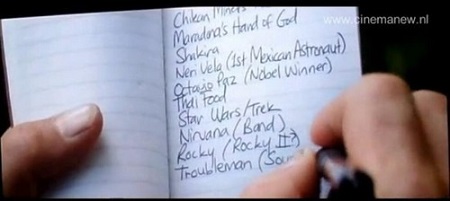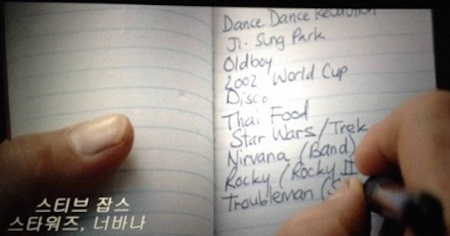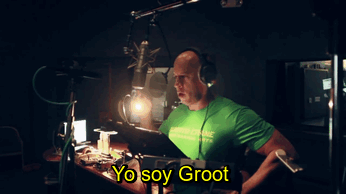6 Famous Movie Scenes You Never Knew Were Different Overseas

Opening a Hollywood blockbuster isn't as easy as dropping the whole damn script into Google Translate. Subtle linguistic changes must be made to preserve the filmmaker's intention in another language. In fact, some famous movies and shows put a whole lot of effort into things no one in the U.S.A. ever saw (unless you're one of those weirdoes who watch all the Blu-ray extras). We're talking about stuff like ...
Vin Diesel Learned How To Say "I Am Groot" In 15 Languages For Guardians Of The Galaxy
One of the most complex and demanding characters Vin Diesel has ever played is Groot, the walking tree from Guardians Of The Universe (who only ever says "I am Groot"), No, seriously. Not only did Diesel stand there and carefully consider the most appropriate inflection for each "I am Groot," but he repeated the entire process 15 times -- once for each additional language.
Yeah, instead of letting foreign fans figure it out for themselves ("Hold on, is that tree guy still Groot?"), Diesel redubbed his line in a new language for each international version. The dedicated actor learned how to say "I am Groot" in Hungarian, Hindi, Czech, Polish, Spanish, Portuguese, Ukrainian, Mandarin, Japanese, French, Italian, Kazakh, German, Russian, and, you know, English. And he wasn't just mindlessly reading from a prompter, either -- even after the movie was finished, he was still able to remember several of his non-English lines when put on the spot by Jimmy Fallon.
To top it all off, Diesel was so dedicated to his craft he wore stilts during filming (and to the premiere, and on the set of Furious 7, for some reason) to better get in the headspace of his vertically enhanced character.
Meanwhile, Bradley Cooper (the voice of Rocket Raccoon) didn't even try to fight an alley cat over a half-eaten sandwich he found in a trash container. It's clear who was phoning it in.
Hodor Doesn't Say "Hold The Door" In Every Language
Game Of Thrones kills off characters with Ex-Lax-style regularity, but some deaths really stand out from the pack. In what is arguably the most heartbreaking scene in the show, gentle Hodor gives his life holding a door to allow his friends to escape a horde of the undead.
As if that wasn't sad enough, the scene also reveals that Hodor knew how he was going to die his whole life. Because of the show's time-travel shenanigans, young Hodor (or as he was known at the time, Wylis) psychically witnessed his future self's final moments while hearing the other characters scream "Hold the door!" -- causing him to repeat that phrase over and over until it became "Hold door" and finally "Hodor." Hence his name and Groot-esque vocabulary.
This created unique problems for those adapting Game Of Thrones to other languages. See, "Hold the door" devolves perfectly into "Hodor" in English, but if other countries translated that phrase literally, it'd just sound like gibberish. That means for that for each international version, the producers needed to find a phrase that made sense with the action of the scene and still sounded kind of like "Hodor." Some managed to find convincing solutions ...
Sweden: "Shut the door!"

Italy: "Block the horde! The horde! The horde!"

... while others were a bit of a stretch.
France: "Don't let them get outside! Not outside! Not outside!"

Poland: "Hold the dead as long as you can!"

Anyone watching this episode in Poland probably wondered why a bunch of kids about to get murdered by monsters are taking the time to shout "Hold the dead for as long as you can!" when they could easily replace 88 percent of that sentence with "door." Meanwhile, it looks like fans in Latin America weren't thrilled with the version they got ("Leave it shut! Itshoot! Hoot! Hodor!"), judging from the number of dislikes on every YouTube clip of this scene.
Hey, at least they tried. The Hebrew and Czech translators clearly just didn't give a fuck:
Czech Republic: "Hurry into the mountains!"

Israel: "Hold the door!"

"Translator's note: Please pretend this character's name was always Zombies R. Comin.'" Captain America's To-Do List In
The Captain America franchise is the story of a 90-year-old man who doesn't remember the past seven decades trying to make sense of today's world and occasionally punching machines. So, your grandpa. The Winter Soldier explored this aspect of the character by showing us that Cap keeps a to-do list of cultural touchstones he wants to catch up on:

However, if you saw the movie outside of the U.S., you may notice a few discrepancies in that list. You're not misremembering -- perhaps to make paying to see a movie called "Captain " more palatable, Marvel made different lists for different parts of the world. For instance, English Steve needs to research The Beatles, the show Sherlock, and Sean Connery. Just, Sean Connery in general.

Captain France considers Daft Punk and The Fifth Element to be unmissable pop culture moments:

All Marvel films have been banned from France because they forgot to include Jerry Lewis here.
And Mexican Cap wants to look into Chilean miners and Argentinian soccer players, because all the countries down there are basically the same thing.

Incidentally, in Brazil, the good ol' Captain wants to look into a band called "the Assassin Boobies," and now so do we.

And finally, we're not sure what the most bizarre mental image in the South Korean version is: Captain America watching the incest plot twist Oldboy, or playing Dance Dance Revolution.

The Typewriter Scene In The Shining Had Unique Manuscripts For Different Countries
Stanley Kubrick was known for many things, but chillaxing sure wasn't one of them. He would routinely force dozens of takes for insignificant scenes until the actors got them just right and/or the voices in his head subsided. As we've covered before, he was a particular butthole on the set of The Shining, traumatizing poor Shelley Duvall and making his secretary spend months typing up individual, unique pages of Jack's manuscript. You know, this literary masterpiece:

But Kubrick's weaponized OCD didn't stop there. Kubrick, it seems, thought the impact of the manuscript scene would be diminished if foreign viewers had to read a subtitle explaining what it says in all those pages (as opposed to, you know, reading the pages). On top of that, there's the repetitive phrase itself: "All work and no play make Jack a dull boy." While the words could certainly be translated into other languages, the saying itself only exists in English, so it would lose considerable context and meaning. But hey, who gives a shit about this one line of idiom in a two-and-a-half-hour film, right? Kubrick, of course.

Yep, as if making one version of the manuscript wasn't tedious enough, Kubrick had the pages redone at least four different times for the international versions of the movie -- each containing a real saying from that particular country. The German version got "Was du heute kannst besorgen, das verschiebe nicht auf morgen," or "Never put off until tomorrow what can be done today," which we like to think was a passive aggressive dig at the poor staffer developing carpal tunnel syndrome over this.
To be fair, the alternate pages do illustrate why this change was necessary after all, in that they sound weird as hell translated back to English. Spanish viewers got the baffling line "No por mucho madrugar amanece mas temprano" ("No matter how early you get up, you can't make the sun rise any sooner"), while the French saying was the Stuart Smilie-esque affirmation "Un Tiens vaut mieux que deux Tu l'auras" ("What you have is worth much more than what you will have"). The Italian version wins, however, reading "Il mattino ha l'oro in bocca," or "The morning has gold in its mouth." Of course it does, Italy. Of course it does.

"But I'm not the- yes, sir."
Lots Of Disney Movies Change Little Details To Suit Different Cultures
It's not uncommon for animated movies to go the extra length to make sure kids all over the world never even notice they're watching a foreign product. For instance, Zootopia switched up the animal newscasters depending on each location -- the U.S. got a moose, China got a panda bear, Australia got a koala, and Brazil got a jaguar.
In some countries, the animals were even voiced by local newscasters whose voices might sound familiar to kids. Zootopia's tale of tolerance and inclusivity was perfectly tailored to present children the world over with things instantly recognizable to their own culture ... which is kind of the opposite point of the movie, now that we think about it.
Anyway, as usual, Pixar takes this sort of thing to a whole other level. They don't just redo much of the onscreen text so it matches each country's language ...


... (Or at the very least change the letters to something more universal) ...


... But they'll even remake some visuals to alter elements of the plot. Riley from Inside Out may be a hockey fan in the U.S. version of the movie, but in other countries, she's some sort of maniac who actually likes soccer. Her least favorite food was also switched up in order to achieve maximum vomitude based on regional unprefrences. In Japan, for example, kids apparently don't hate broccoli, so Pixar grossed them out with bell peppers instead.


Hell, even Planes, which you've no doubt already forgotten existed, took the time to tailor one of the aircraft to feature the national colors of different countries:

Steven Spielberg Stops Lincoln For A History Lesson
The beard, the hat, the gift freedom ... who doesn't know the unmistakable Abraham Lincoln? Well, people from Not-America, for starters. When Steven Spielberg's Lincoln was gearing up for its international release, research from the studio showed that almost everyone out there has heard of Honest Abe, but they don't have much of an idea about the specifics of his work or why he's such a big deal in the U.S.

Luckily for Spielberg fans not familiar with American history, the director was considerate enough to provide moviegoers with a little cheat sheet -- most countries got an all-new introduction explaining the Civil War and its context through text and black-and-white images. Considering the alarming number of people who buy into the revisionist "It was about states' rights!" crap, we're starting to think they should have included this part in the U.S. version.




However, for the Japanese release, Spielberg went one step further. Perhaps convinced that Japanese audiences don't like stories told through words and pictures if they don't include 15 pages of superpowered men throwing energy balls at each other, Spielberg decided to appear on screen himself to give the country a brief crash course on U.S. history. OK, now we kind of want Indiana Jones And The Last Crusade to start with Spielberg going, "Whelp, the Jones boys really stepped in it this time ..."

The intro scene was preceded by another intro scene explaining that this is the man who gave birth to E.T.
Carolyn's tweets are a travesty no matter where you are. Kelly's tweets are lost without translation.
For more ways famous movies are handled overseas, check out 5 Classic Movies With Way Better Insane Foreign Ripoffs and 9 Foreign Rip-Offs Cooler Than The Hollywood Originals.
Subscribe to our YouTube channel, and check out 6 Insane Foreign Remakes Of Famous American Blockbusters, and other videos you won't see on the site!
Follow us on Facebook, and we'll follow you everywhere.





